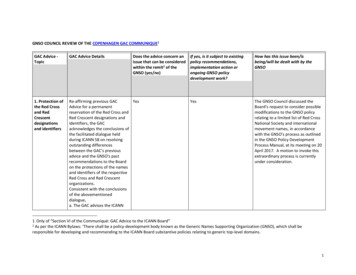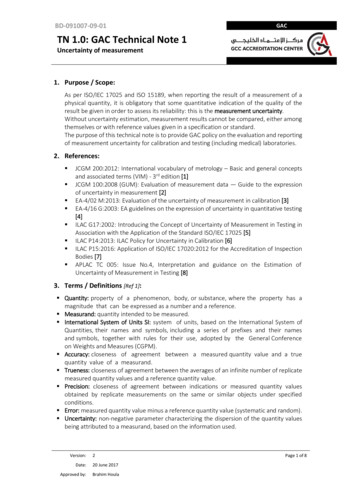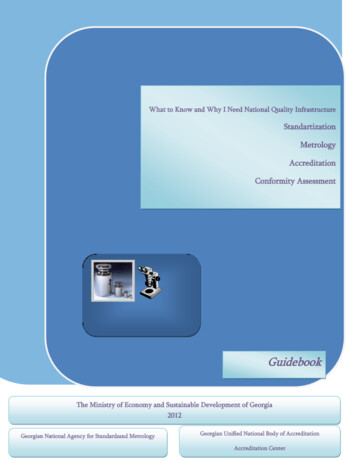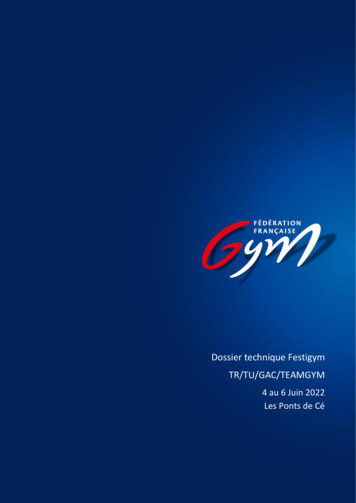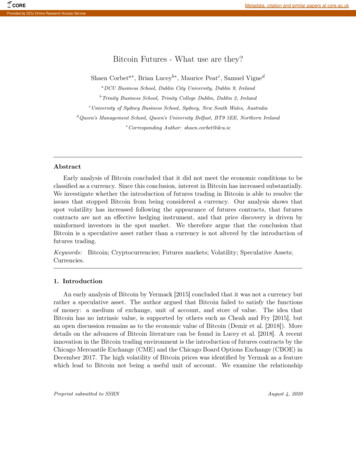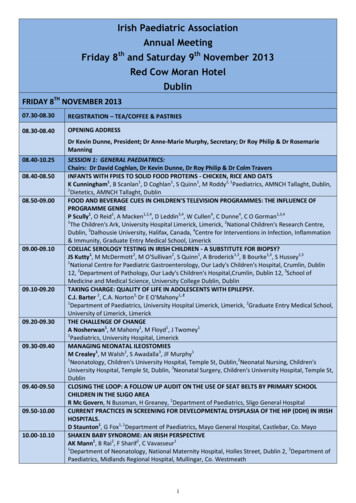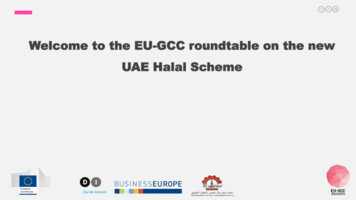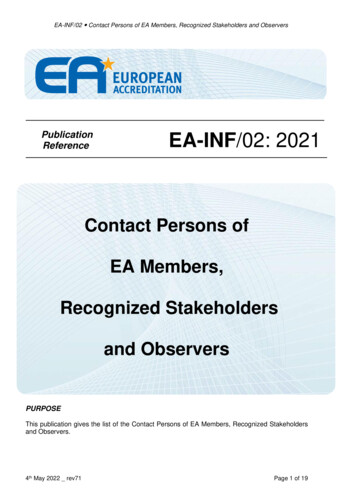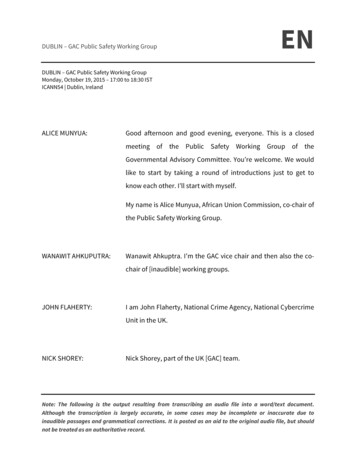
Transcription
DUBLIN – GAC Public Safety Working GroupENDUBLIN – GAC Public Safety Working GroupMonday, October 19, 2015 – 17:00 to 18:30 ISTICANN54 Dublin, IrelandALICE MUNYUA:Good afternoon and good evening, everyone. This is a closedmeeting of the Public Safety Working Group of theGovernmental Advisory Committee. You’re welcome. We wouldlike to start by taking a round of introductions just to get toknow each other. I’ll start with myself.My name is Alice Munyua, African Union Commission, co-chair ofthe Public Safety Working Group.WANAWIT AHKUPUTRA:Wanawit Ahkuptra. I’m the GAC vice chair and then also the cochair of [inaudible] working groups.JOHN FLAHERTY:I am John Flaherty, National Crime Agency, National CybercrimeUnit in the UK.NICK SHOREY:Nick Shorey, part of the UK [GAC] team.Note: The following is the output resulting from transcribing an audio file into a word/text document.Although the transcription is largely accurate, in some cases may be incomplete or inaccurate due toinaudible passages and grammatical corrections. It is posted as an aid to the original audio file, but shouldnot be treated as an authoritative record.
DUBLIN – GAC Public Safety Working GroupENEVA PETSCH:My name is Eva. I’m coming from Germany from the [BK].ALICE MUNYUA:Yes, sorry. It’s a closed GAC Public Safety Working Groupmeeting.KIMMO ULKUNIEMI:Kimmo Ulkuniemi from INTERPOL, Global Complex forInnovation.[JOE]:Joe [inaudible]. Also from INTERPOL, but I’m based at thegeneral secretariat in [Lyon] and France.ANNALEISE WILLIAMS:I’m Annaleise Williams, the Australian GAC representative.PITINAN KOOARMORNPATANA:Hi, I’m Pitinan Kooarmornpatana from Thailand GACteam.UNIDENTIFIED MALE:Page 2 of 61[inaudible], Thailand.
DUBLIN – GAC Public Safety Working GroupENBOBBY FLAIM:Bobby Flaim, Federal Bureau of Investigations.LAUREEN KAPIN:Laureen Kapin, United States Federal Trade Commission.IRANGA KAHANGAMA:Iranga Kahangama, Federal Bureau of Investigations.STEPHEN TRUICK:Steve Truick from the MHRA in UK.[THOMAS WALDEN]:Thomas [Walden], Drug Enforcement Administration.JIM EMERSON:Jim Emerson, International Association of Chiefs of Police.MIKE FREEMAN:Mike Freeman, US Drug Enforcement Administration.CARMEN ALVAREZ:Carmen Alvarez, Drug Enforcement Administration.KARINE PERSET:Karine Perset, GAC support staff.Page 3 of 61
ENDUBLIN – GAC Public Safety Working GroupRUSSELL RICHARDSON:Good afternoon. Russell Richardson, from the InformationTechnolog Authority in the Cayman ionforSecurityandCoordination in Europe.UNIDENTIFIED MALE:[inaudible], chairman, GAC representative.GREGORY MOUNIER:Good afternoon. Gregory Mounier from EUROPOL.ADRIAN KOSTER:Adrian Koster from the Swiss Government Critical InformationInfrastructure Protection Unit.UNIDENTIFIED MALE:[inaudible]. I’m an advisor to the Indian GAC representative.UNIDENTIFIED MALE:[inaudible]. I’m an advisor to the Indian GAC representative.Page 4 of 61
DUBLIN – GAC Public Safety Working GroupENUNIDENTIFIED MALE:Hi, I’m [inaudible] from Quebec Provincial Police.CATHRIN BAUER-BULST:Cathrin Bauer-Bulst, European Commission.FABIEN BETREMIEUX:I’m Fabien Betremieux from ICANN staff. I’m supporting thespeculative insecurity framework initiative.ALICE MUNYUA:Thank you very much. I hope everybody has introducedthemselves. Yes, please, introduce yourself.UNIDENTIFIED MALE:I am Dr. [inaudible]. I am the cyber coordinator in the [inaudible]of India.ALICE MUNYUA:Is that everybody? Okay. Thank you very much, everybody.We’ve just come from a very interesting public session and Iwould like to thank everybody who presented there. Veryinteresting questions came up and we promise that we willrespond to them online. So we are going to put that as part ofour agenda to discuss how we are going to address that.Page 5 of 61
DUBLIN – GAC Public Safety Working GroupENBut very quickly, the agenda for today’s meeting is first lookingat our work plan, trying to complete that in any way we canbetween now and perhaps the short-term and medium-term.Then perhaps discuss participation in some of the PDP[sections], especially GNSO. And it’s good to have one or twoICANN staff here so they can help us, perhaps. And Karine canhelp us think through how we may be able to do that so that weare working together with the ICANN processes, rather thanreacting to them as part of the public comment.Then the Affirmation of Commitments and looking specifically atconsumer protection and competition, and issues arising fromtoday’s public session.So I just want to hear from you that this agenda is acceptable,whether there’s anything we need to add, any comments on theagenda. Bobby? No, okay. So shall we accept the agenda as it is?Okay, thank you very much. I’ll hand over the first session toThailand to chair.WANAWIT AHKUPUTRA:[Maureen], do you have the work plan to show?ALICE MUNYUA:The work plan, yeah.Page 6 of 61
DUBLIN – GAC Public Safety Working GroupWANAWIT AHKUPUTRA:EN[inaudible] just joined. I think the Public Safety Working Group,we have two or three [inaudible] or assignments that have been[inaudible] also with spec 11, that part of the very critical issuesof us as well as the GAC advice from Beijing. We also have theprivacy – proxy, privacy. Several aspects. We have [been making]presentations that several constituencies conduct. Severalstudies [inaudible] have quite concerns on how we bring theissues of public safety into all this work and look into the holisticapproach more than look into bit and pieces, because they’retalking about several issues, like IDN (Internationalized DomainNames), translation, transliteration, [inaudible] only some of thegTLDs and they have the thick WHOIS, they have WHOIS reviews.Even the GAC. We put it in the communique in LA about, in fact,what it is that we need to [be] working on, because for us, wealso [confused] actually what is the WHOIS that we’re talkingabout. So I think the GAC work plan template that is showingyou, I think we’re working on the framework. The terms ofreference is already done and we have been getting that GAC[approved] already. Is it not also in the communique? No, it’s notyet. So WHOIS [inaudible] specification reviews and the publicsafety agency [inaudible] August 2015. [inaudible] and commenton the privacy-proxy accreditation service initial report of GNSO[inaudible] PDP working groups developed by Public SafetyPage 7 of 61
DUBLIN – GAC Public Safety Working GroupENWorking Group approved, endorsed by the GAC, and submittedto GNSO PDP [SAI] PDP Working Group already.So we have Next Generation Registry Directory Services shouldbe on the way. There are some points that have been made by[inaudible] that GAC is currently working on on the NextGeneration.We have a second face-to-face meeting. Is that meeting inWashington, DC? Yes, we have on the [10th] of September. Andwe have participation [inaudible]. We have a [inaudible] half-aday meeting there in the US.We also submit [PSWG] in GAC for comments, approval. The[letter] of Number Resource Organization letter was approvedand [announced] by the GAC [inaudible]. Not yet? Okay, but it’sapproved and we will submit to the [inaudible]. It should be onits way.I think it’s quite an important milestone because the IP is alsovery important, and to have the approve that we would try tosubmit the letter on the WHOIS [inaudible] on the address of theIP is critical to [PSWG].Now I think we can go on to the case study of several areasincluding [inaudible] investments, scams. We need to have thePage 8 of 61
DUBLIN – GAC Public Safety Working GroupENdetail, that what should be the outputs. [Alissa] will actually leadthat case study. Do we have the names already? No, not yet.They have the topic of [inaudible] closer cooperation amongregulators [inaudible] support from registrar, registry, to addresssome of the public safety concern. This is ongoing and longterm, and I think we need to find out the detail on the actionwhat needs to be done. Is that correct?And then outreach to the members of developing countries[UCOAS] GAC. Public safety agency in developed regions. I thinkthis is part of the critical work that we’re identifying as wellbecause most of the problems that we also face is also comingfrom – the [target] is to the developing countries, like Thailand isalso one of the targets that have been in the new gTLD securityframework spec 11. Fabien is sitting here, so he’ll [inaudible].That is the first page. So it should be ALICE MUNYUA:Thank you, Wanawit. I would like to suggest up until the face-toface meeting 10 September, I think those are activities that havealready taken place. So going forward, the next ones we do needto discuss the letter to the NRO that was circulated to the list,and perhaps I may ask Bobby from the FBI to quickly give us aquick update, especially on the rationale, so that this group canthen – we can then send it back to the list for approval. Because IPage 9 of 61
DUBLIN – GAC Public Safety Working GroupENwould like to send the letter to the GAC by the time we finish thismeeting. So Bobby, please?BOBBY FLAIM:Sure. One of the rationales for doing this is that we’ve had theRegistrar Accreditation Agreement. We’re working with theregistries right now on domain name WHOIS, which for publicsafety organizations, is very important. But what is actually evenmore important is IP address accuracy, which we don’tnecessarily discuss here at ICANN. That’s really discussed at theRegional Internet Registries. But the rationale is that theRegional Internet Registries such as RIPE, ARIN, APNIC, AFRINIC,and LACNIC activity do gather here under what they call theAddressing Supporting Organization. And they work with their It’s the same organizations. It’s the Numbering ResourceOrganization.So what these groups do together as they’re representing all ofthe five Regional Internet Registries is that they work on globalpolicies, because the way the Regional Internet Registries workis they have a contract that they sign with organizations askingfor IP addresses. They call them different names and theindividual regional registries. I know in RIPE, LACNIC, andAFRINIC, they call it a Registry Service Agreement (RSA). I thinkPage 10 of 61
DUBLIN – GAC Public Safety Working GroupENit’s a Membership Agreement in RIPE. And apologies I can’tremember what they call it in APNIC.But these are basic contracts that they sign with anyorganization such as an Internet Service Provider, a localInternet registry, that allocates IP addresses throughout theirrespective regions.But what those RSAs or contracts are supplemented by – andthis is very key – are policies. Kind of like how ICANN comes upwith policies that the GNSO or ccNSO works on here, theRegional Internet Registries have IP policies.So I know in our region and also RIPE public safety agencieshave tried to encourage WHOIS accuracy. This is becoming evenmore important as we go from IPv4 to IPv6, and moreimportantly Internet of Things. Everything from your phone toyour TV, you name it, is going to have an IP address. It won’tnecessarily have a domain name, but will have an IP addressand that’s an important piece of information insofar asattribution and transparency on the Internet.Some of the other things that are going on that kind of dovetailwith this is that the IETF (the Internet Engineering Task Force)actually have drafted a new WHOIS protocol called RDAP, whichis Registry Data Access Protocol. And they’ve already hadmeetings here at ICANN on how that is going to be implementedPage 11 of 61
DUBLIN – GAC Public Safety Working GroupENon a policy level on the domain side. But what’s alreadyhappening is on the Regional Internet Registry side, that isalready being deployed, the RDAP.That’s key because it’s a centralized database of WHOISinformation and what goes into it relies upon the policies ofeither ICANN on the domain side or the Regional InternetRegistries on the IP side.Therefore, what we’re trying to do is have more of a holistic andconcentrated approach on WHOIS and the IP addressing is veryimportant. So what we wanted to do as the Public SafetyWorking Group is present a letter to the Numbering ResourceOrganization, which includes all of the five Regional InternetRegistries stating that we at ICANN have some domain nameWHOIS accuracy requirements, voluntary practices, and it wouldbe very helpful to public safety agencies if that could bemirrored on the IP addressing side.So the letter which you have received and also the backgroundinformation, which was distributed by yourself, Alice, last weekkind of explains why we need it and the very nice request todevelop global and consistent IP WHOIS policies so that whenpublic safety agencies are looking for that attribution on an IPaddress, we’ll be able to find it.Page 12 of 61
DUBLIN – GAC Public Safety Working GroupENSome of the issues and why we’re doing that is right now youdon’t have that WHOIS accuracy. A lot of times when theRegional Internet Registries provide IP addresses to Internetservice providers or local Internet registries, those organizationsassign or reallocate IP addresses down the line. And once the dothat, you further and further away from WHOIS accuracybecause a lot of that is not necessarily reported. So that’s therationale.I hope that clarifies. It’s a little bit of a convoluted process, butone that’s very important because we here at ICANN are focusedon domain name WHOIS, but what’s even more important is theIP WHOIS, which isn’t nothing necessarily addressed at ICANN,but the regional Internet registries are part of the whole Internetgovernance ecosphere, if you will. And now with IANA and thetransition, this will be even more important as well.I hope that was a good enough description, and if anyone hasany questions, I will be happy to answer them.ALICE MUNYUA:Thank you very much, Bobby. Any comments or questions? Yes,please, India?Page 13 of 61
DUBLIN – GAC Public Safety Working GroupUNIDENTIFIED MALE:ENJust a very quick comment. It’s not even a question, but ratherjust to add on to what you were saying. One thing that we haveobserved – and I think there have been comments to this effectin other fora that have been put forward. When it comes to IPv4numbers, because almost all of the RIRs, except for the AfricanRIR, have run out of IPv4 numbers.There is now a very robust secondary market in IPv4 numberswhich has further degraded the quality of the IPv4 WHOIS tablesacross all RIRs. That’s something that needs to be addressedand needs to be addressed through global policies, perhapswhich regulate the transfer of IPv4 addresses on the secondarymarket, which is a daunting task but definitely something that’simportant.BOBBY FLAIM:Yes. I think initial request of the Regional Internet Registries willbe a long process, probably a couple of years. The other thingthat I failed to mention is that the difference between IPv4 andIPv6 is the fact that IPv6, the blocks of IP addresses are going tobe much, much larger. And with that, the allocation is going tobe larger so there’s going to be more sub-levels of allocationsand assignments that will go down and down and it will be hardto keep that straight and keep that accurate. So we’re trying toPage 14 of 61
DUBLIN – GAC Public Safety Working GroupENget a jump on it and be a little bit proactive as IPv6 is beingdeployed.ALICE MUNYUA:Any other comments or questions? Yes, please?UNIDENTIFIED MALE:Yeah. Just one, Bobby. In terms of the reassignment of IPv6space and the attribution and traceability that we look for,we’ve done a lot of extensive research on RIPE WHOIS. I don’tknow if this is part of the letter to influence, but there’s somequite good reassignment WHOIS at the sub-delegation levelcoming out of hosting providers. So if you’re looking at slash-29,a few IPs that have been reassigned. I think the RIPE policy isyou don’t have to show the sub-delegation record, but most ofthese hosting providers that have this reseller WHOISinformation that we’re looking for, this delegated record, quitewell granularly populated and the WHOIS details look[inaccurate]. But it’s a start and it’s a lead like the domainWHOIS because we’re going to get web mail e-mails in there.The recording and the population of small blocks of IPs anddiversified bullet proof host infrastructures, for example, isthere. There’s only so far a [inaudible] company can go to knowyour customer over someone from [South Russia].Page 15 of 61
DUBLIN – GAC Public Safety Working GroupENI think it’s good to maybe show them what we’re doing well, andwe want more of that in an IPv6 [space] because [they’re] tryingto do that in IPv4.Yeah, absolutely. There are already some existing policies withinsome of the Regional Internet Registries. And I think, to yourpoint, what we’re trying to do is highlight if those are goodpractices and they are working and to make sure that they’reglobal.So we may be going to some of them, and they’re like, “Well,that’s very nice, but we already have that.” And that would begreat. That actually might be the starting point for some of whatwe’re trying to accomplish, which is globally coordinatedpolicies that would look alike in all of the international RegionalInternet Registries.ALICE MUNYUA:Thank you. Any other comments? Yes, please? UK.UNIDENTIFIED MALE:Thank you, Alice. Just without wishing to get too big in terms ofour blue sky thinking, I think it was a really interesting point youmade, Bobby, there regarding the inter-dependency of thesedifferent organizations or bodies of organizations with respectPage 16 of 61
DUBLIN – GAC Public Safety Working GroupENto a cybercrime investigation, for instance. The different types ofsolutions that might be available in the broader perspective.So just for the benefit of those who weren’t in the public sessiona short while ago, in the UK we set up a UK sub-group, so webrought the broader spectrum of public safety bodies who mighthave an interest in this area together and we have meetings inLondon once a month and we discuss the issues that come outof this group.But as an inevitable consequence of the enthusiasm of all ofthose people, the discussion topics then kind of invariably go offto, “Well, there’s this standard that this RFC that’s beendeveloped which could help us – if implemented more widely,could help us sort of secure e-mails from being fraudulentlyfaked when sending out spam.As you say, there are things that we could do with the RegionalInternet Registries for improving their WHOIS.There’s bestpractice work that’s going on within the Internet GovernanceForum. I don’t want to drag on too long, but one of the thingsI’ve been trying to do back in the UK is do a bit of a coordinationpiece because there are other sort of government departmentsor areas within my own department who have more of a focuson the IETF. The home office have a clear interest in this area.Page 17 of 61
DUBLIN – GAC Public Safety Working GroupENSo I’ve been trying to do a bit of coordination and find out who’sdoing this or who’s got an interest in this area elsewhere, andhow we might be able to bring that forward into a broader thing.It’s not been easy. It’s sort of like running down rabbit holessometimes it seems.That’s certainly the comments that have come up in our groupabout the DNS is one element, but there’s a broader issue andit’s all to tackle the overall problems of maybe cybercrime. Youcan do one thing, but you’ve got to do a sort of collective thing.It might be something for consideration maybe if people aroundthe room [inaudible] chat about it.ALICE MUNYUA:Thank you. Bobby, do you have any other comments? Yes,please.UNIDENTIFIED MALE:I think the accuracy of the registry information is very importantand I think on the floor in the previous session there was aquestion on the recommendation. How do we verify theinformation? I’m new to this working group, so I’m not sure ifthat’s included in the literature in the NRO. If not, then how canwe provide them with recommendation at the policy level, or dowe recommend them to do it in their own working group toPage 18 of 61
DUBLIN – GAC Public Safety Working GroupENcome up with a way to standardize verification method for theaccuracy of the WHOIS information.BOBBY FLAIM:I think it’s up to the individual Regional Internet Registries onhow they would verify the information. I know ARIN in NorthAmerica actually sends out an e-mail to kind of verify the pointof contact. So they send that out once a year. But the thing isthat a lot of people actually don’t answer that.One of the challenges that we are going to have, as long as we gointo this with eyes wide open is the fact that, kind of like ICANN –and it’s a little bit frustrating to us, but it’s not just ICANN. It’s alot of the Internet governance organizations is that there’s reallyno enforcement mechanisms. So they can ask and they can askvery nicely and they can ask nicely twice and three times, butyou won’t necessarily get the information or the verification onthe validation in which you’re asking for.But, we have to start somewhere and it’s the idea that we’reasking them trying to come up with – like John is trying to comeup with voluntary practices on the spec 11. Asking them tomaybe adopt voluntary policies and enforcement mechanismsand maybe shine a light on this in which we would be able toactually do that. That’s one of the reasons here. We’re hoping toincrementally get to that point.Page 19 of 61
DUBLIN – GAC Public Safety Working GroupALICE MUNYUA:ENThank you very much, Bobby. We’d like to close this now. I thinkwe have agreement generally on sending the letter. So we’regoing to give our colleagues who are not present in this meetinganother couple of days for any comments they might have onboth the draft letter and the rationale [we’ve] provided.Then towards the end of the week or beginning of next week,we’re going to send it to the GAC for approval endorsement, andthe letter will be submitted to the NRO. So we’re in agreementwith that? Yeah. So we give ourselves another couple of days forany comments and the letter will be sent off. Okay, thank you.On the work plan, the next issue here is the case studies inseveral areas. This issue was identified during our face-to-facemeeting September 10th. I think I’d like to invite Laureen andBobby again to just take us through very quickly some of theareas that were identified where we may need as a group tohave case studies. So again, either Laureen or Bobby.LAUREEN KAPIN:We’re still in the midst of figuring out the best way to go forwardon this. But basically, for those in the room who were in the lastsession, which I think is a good many of us, many times we arefaced with questions, the gist of which is, well, why is it soPage 20 of 61
DUBLIN – GAC Public Safety Working GroupENimportant, all this WHOIS stuff? Has that ever saved anyone’slife? Has that ever stopped any crimes?Of course, as those of us who are on the front lines ofinvestigative work, we know that, as Greg pointed out, WHOIS isa piece of the puzzle that we use to figure out who is behind –hence the name “who is” – behind elicit activities. And to theextent we can draw on our own experiences and those of ourcolleagues who are on the front lines of investigations inconsumer protection matters, in criminal matters, in childexploitation matters and share those stories. And to the extentwe have, if there’s data to share, how many cases are yourinvestigators working on matters? We’re looking at WHOIS as astandard part of their investigation. That’s useful information toget out there and share with, shall I say, the more skepticalmembers of the multi-stakeholder community.That’s really what we discussed as an idea, as a plan, in ourSeptember 10th meeting. As you can hear from questions in theroom, it’s not as persuasive to just tell people, “This is ourposition. We know what we’re talking about.” People want toknow why. People want to hear actual examples. Also, peoplelong to hear stories. They want to hear, “This is the story of a badperson who was trying to rip off consumers,” and howinvestigators at the Federal Trade Commission did WHOISsearches and reverse WHOIS searches and put data together toPage 21 of 61
DUBLIN – GAC Public Safety Working GroupENfind a commonality that pointed to the one person behind the email address and then was able to stop an advance fee loanscam that was targeting people who were in financial distress.That’s much more compelling than “This information needs tobe accurate because we’re relying on it in our investigations.”That’s the gist. If you want to add anything, Bobby?BOBBY FLAIM:No. I’ll just echo what Laureen said. Greg today did a great job inproviding EUROPOL examples. That’s why we really do needinternational examples, because I think people think that it’sjust reserved to a certain region. And the one great thing aboutbeing a public safety agency is that we all pretty much are on thesame sheet of music, especially law enforcement, which is tofind the bad guy. And people do want to hear the stories.When we came out with the law enforcement recommendations,it’s like, “Why? Prove it. Please demonstrate the need.”So that’s kind of a seed that we want to put in people’s heads,that these examples – these war stories, if you will – are needed.They don’t have to be voluminous. You don’t have to necessarilycome up with stats detailing every instance. But a few storieswould go a long way on many different issues – botnets, childexploitation, kidnappings, murders, robberies, consume fraud,Page 22 of 61
DUBLIN – GAC Public Safety Working GroupENpublic health issues where you’re talking about illegal orcounterfeit, more importantly, counterfeit, drugs being sold thatare doing harm or even killing people.These are very dramatic examples and they highlight the needfor what we’re doing. So we wanted to highlight that and get thethought process, or at least the thought in people’s heads, thatgoing forward we’re going to try to present these as we go andask for these things, such as WHOIS specification or proxy orDNS and IP accuracy, so on and so forth, because that ties in.There’s a reason for why we’re asking for what we’re asking for.LAUREEN KAPIN:Maybe we can even I’m just curious. Just an informal poll.Who in the room is representing an agency that relies on WHOISinformation for their investigations? So, most of us.If that’s the case, then we’re asking all of you to share yourgoodies with us. Share your good stories. If WHOIS is a part ofyour investigative checklist, let us know that. We all know whatgoes on in our own agencies, but it would be great to share thatinformation so that we have some persuasive narratives toshare, as I said, with more skeptical members of the community.Page 23 of 61
DUBLIN – GAC Public Safety Working GroupUNIDENTIFIED MALE:ENDo you want information regarding how privacy-proxy is nowcoming in and being used by the criminal groups as well?LAUREEN KAPIN:Yes. And thanks for emphasizing that, because of course that isso connected to WHOIS because it’s a mask over the WHOISinformation. We know that some of the privacy-proxy serviceproviders, some are more responsive to law enforcementrequests than others.BOBBY FLAIM:And we did that. I mean, I did that in the FBI where people wouldpoke me in the chest. “Criminals don’t use privacy servicesbecause they have to pay for it.” I was like, “Yeah, but they do.”That’s why you’re able to counter that and actually knowspecifically.UNIDENTIFIED MALE:I would say I deal with the medicine side of it. Of the newcases I’m investigating, I would say it’s up to 90-odd percent ofthem are now using a privacy-proxy service. It’s very rare that Iactually see a WHOIS record. In fact, when I do see it, I tend toinstantly know it’s a lie. But at least it’s not a [privacy][inaudible].Page 24 of 61
DUBLIN – GAC Public Safety Working GroupUNIDENTIFIED MALE:ENJust a small factual point to add what you were saying. I thinkthat now domain services – Google Domains comes to mind –are offering privacy protection proxy services for free. So youdon’t even have the issue of a criminal having to pay for it. It’spart of the basic package.ALICE MUNYUA:Okay. Thank you. So we agree that this is one of the areas thatwe should work. What we’re going to do [inaudible] iscompleting this document. We’ll come back to all of you and askwhom has case studies that we could share that would build thecase.LAUREEN KAPIN:Alice, it would also be very helpful is for someone to volunteer tospearhead and organize this particular activity, because as wetake on more work, we’re going to have to divide and conquer.And to the extent we can utilize the talent in the room, so thatpeople take ownership over different projects, that’s going tohelp us all be more effective. So what would be extraordinarilyhelpful is for someone to volunteer to take the lead on thiseffort.Page 25 of 61
DUBLIN – GAC Public Safety Working GroupALICE MUNYUA:ENThank you, Laureen. Do we have a volunteer who would be Oh, great. Thank you.UNIDENTIFIED FEMALE:For the record, Greg has volunteered and we are very thankful.UNIDENTIFIED MALE:What’s the timeline for submissions? Are we keeping it fairlytight?ALICE MUNYUA:We have it as ongoing, but I think it’ll depend on what workwe’re What we’re focusing on and where we would need thecase studies to provide evidence. I think it’s ongoing. And as weidentify the areas that we’re going to be working on, then [we’ll]come to you.Yes, Greg, please?GREGORY MOUNIER:I think we could have a document available to pretty mucheveryone where we contribute stories that we can use. It wouldbe kind of a database where we would just tap into. I mean, nowI’ve got two or three cases because I’ve done the work last week,but I’ve heard many other stories. Proxies as well.Page 26 of 61
DUBLIN – GAC
DUBLIN - GAC Public Safety Working Group Monday, October 19, 2015 - 17:00 to 18:30 IST ICANN54 Dublin, Ireland ALICE MUNYUA: Good afternoon and good evening, everyone. This is a closed meeting of the Public Safety Working Group of the Governmental Advisory Committee. You're welcome. We would
